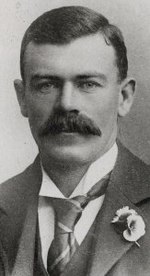About Joe Darling
- Joseph Darling CBE (21 November 1870 – 2 January 1946) was an Australian cricketer who played 34 Test matches as a specialist batsman between 1894 and 1905.
- As captain, he led Australia in a total of 21 Tests, winning seven and losing four.
- In Test cricket, he scored 1657 runs at an average of 28.56 per innings, including three centuries.
- Darling toured England four times with the Australian team—in 1896, 1899, 1902 and 1905; the last three tours as captain.
- He was captain of the Australian cricket team in England in 1902, widely recognised as one of the best teams in Australian cricket history. He was a stocky, compact man and a strong driver of the ball, playing most of his cricket as an opening batsman.
- He was a patient batsman and was known for his solid defence, but he was able to score quickly when required.
- In Sydney in 1897–98, he scored 160 in 165 minutes, including 30 boundaries to assist his team in defeating the English.
- He was the first man to score 500 runs in a Test series and was also the first to score three centuries in a series.
- His captaincy was disciplinarian in nature but his teammates respected his broad cricket knowledge.
- Even tempered with a strong personality, he was a stickler for fair play on the field.
- His teammates gave him the nickname "Paddy" due to a supposed resemblance to the Australian boxer, Frank "Paddy" Slavin. His cricket career was interrupted several times due to his obligations as a farmer, first growing wheat in South Australia, and later as a wool-grower in Tasmania.
- He was a member of several bodies dedicated to agriculture in Tasmania, including the responsible authority for the Royal Hobart Show.
- He was a pioneer in activities such as rabbit eradication and pasture improvement.
- He entered politics in 1921, standing as an independent in the Tasmanian Legislative Council, where he was a forceful speaker.
- He retained his seat in the Tasmanian Parliament until his death following a gall bladder operation in 1946.
Read more at Wikipedia
See Also
- Famous People's Birthdays on 21 November, Australia
- Famous People's Birthdays in November, Australia
- Famous farmer's Birthdays on 21 November, Australia
- Famous farmer's Birthdays in November, Australia
- Famous cricketer's Birthdays on 21 November, Australia
- Famous cricketer's Birthdays in November, Australia


 Date of Birth:
Date of Birth:  Place of Birth: Glen Osmond, South Australia, Australia
Place of Birth: Glen Osmond, South Australia, Australia